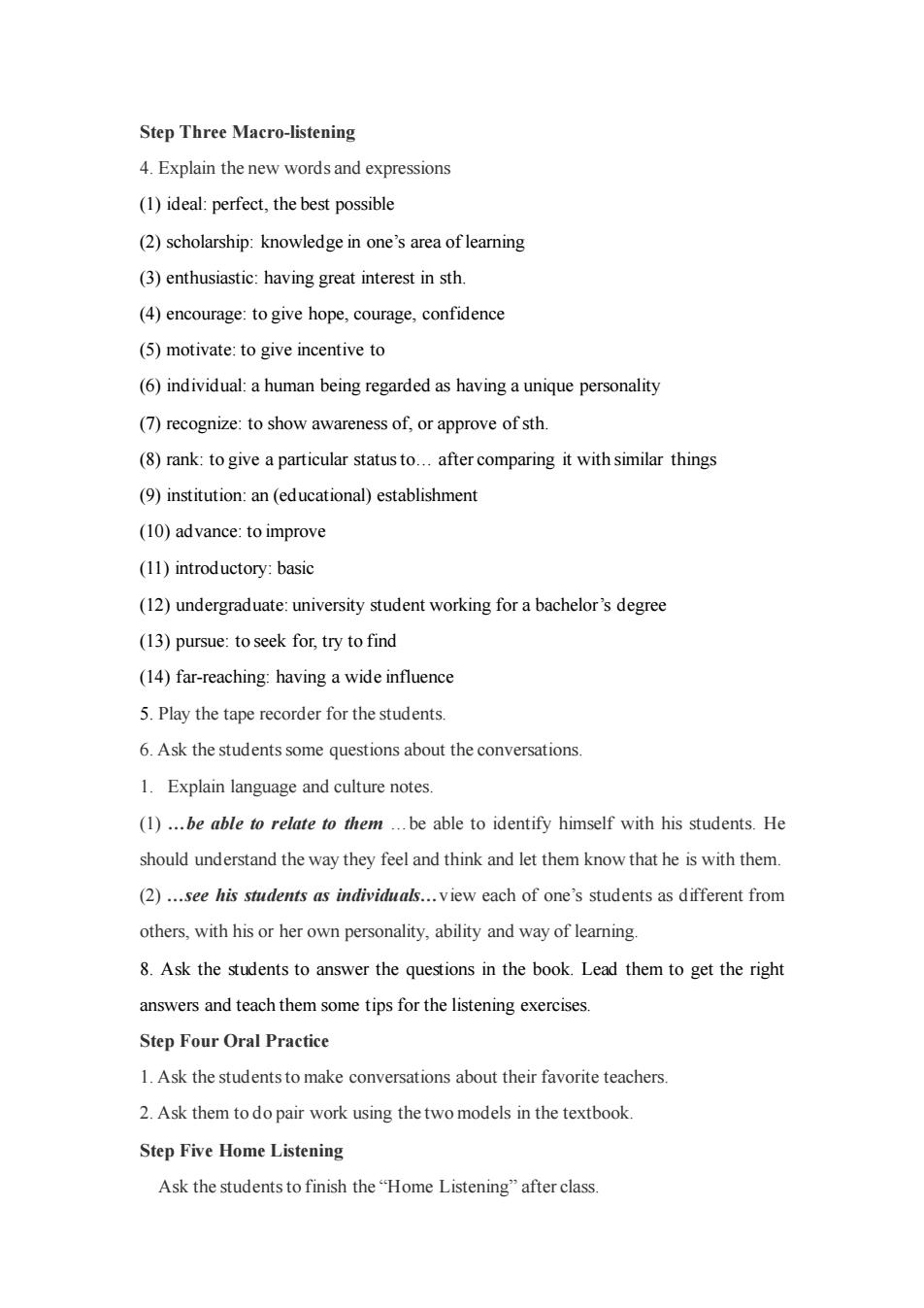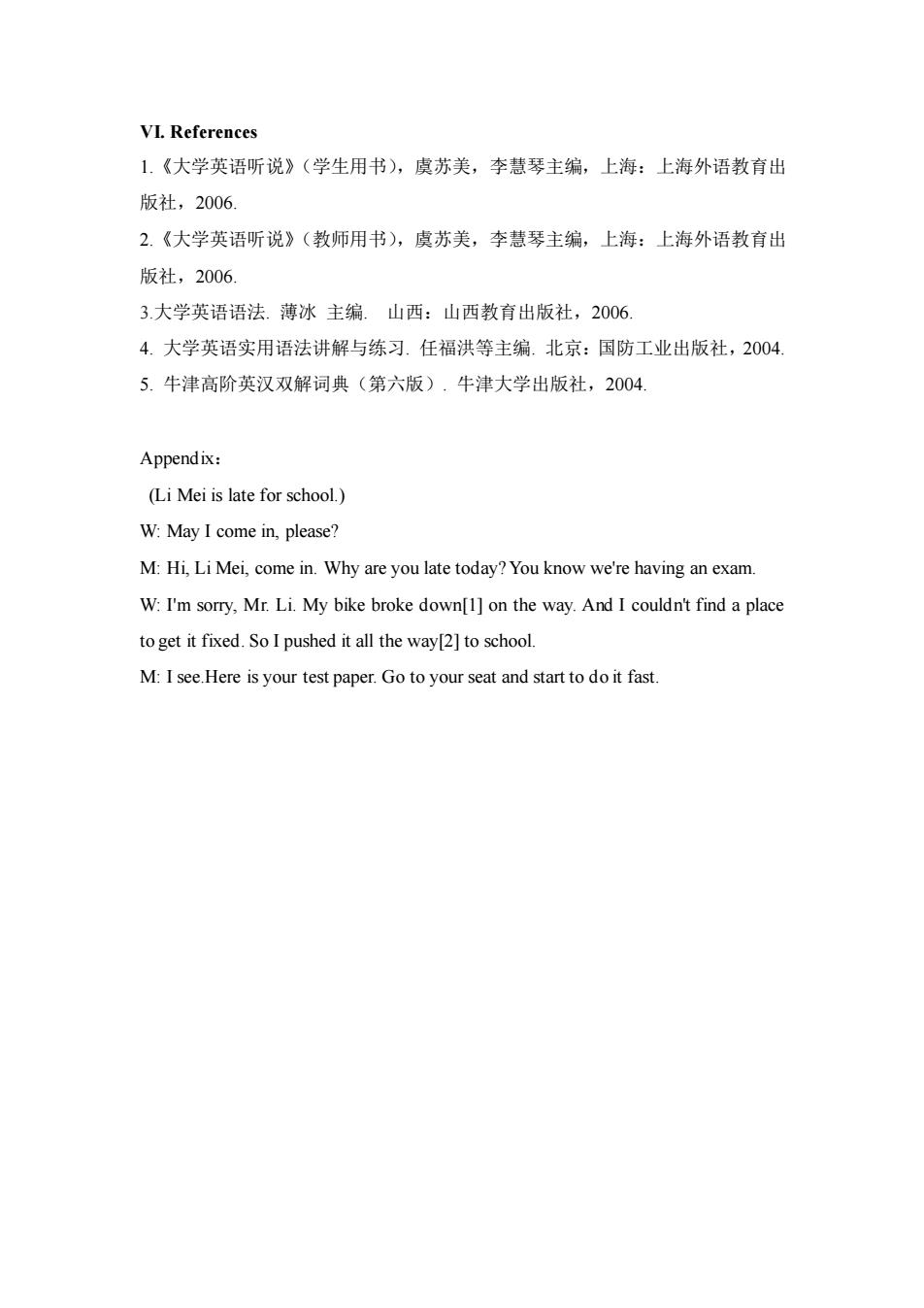
Unit 14 Education LTeaching Aims 1.Master the useful expressions in this unit. 2.Train the students'listening ability to understand the main idea and grasp important details ofa text: 3.Give a brief summary to the conversations and story about education; 4.Improve the student's speaking ability related to the conversations and story abou education II.Teaching Points 1.Ss are required to understand the conversations and story related to education. 2.Train the students'listening and speaking abilities. 3.Useful expressions and words:ideal,personality,scholarship,enthusiastic, encourage,motivate,individual,recognize,institution,advance,undergraduate. pursue,far-reaching.correspondence course III.Teaching Methods 1.Listening and speaking activities 2.Individual,pair,or group work 3.Role-play activities 4.Explanation IV.Teaching Periods Two teaching hours V.Teaching procedures Step one Introduction Education is an indispensible part in the growing process of a modern man Without it,we will not be civilized.Now as a college student,you must have experienced a lot on campus.What'your idea on this topic about education? Step Two Micro-listening 1.Play the tape recorder for the studentsand ask students to listen for the main idea 2.Check the answers. 3.Emphasize some language points and sentence structures
Unit 14 Education I. Teaching Aims 1. Master the useful expressions in this unit; 2. Train the students’ listening ability to understand the main idea and grasp important details of a text; 3. Give a brief summary to the conversations and story about education; 4. Improve the student’s speaking ability related to the conversations and story about education. II. Teaching Points 1. Ss are required to understand the conversations and story related to education. 2. Train the students’ listening and speaking abilities. 3. Useful expressions and words: ideal, personality, scholarship, enthusiastic, encourage, motivate, individual, recognize, institution, advance, undergraduate, pursue, far-reaching, correspondence course III. Teaching Methods 1. Listening and speaking activities 2. Individual, pair, or group work 3. Role-play activities 4. Explanation IV. Teaching Periods Two teaching hours Ⅴ. Teaching procedures Step one Introduction Education is an indispensible part in the growing process of a modern man. Without it, we will not be civilized. Now as a college student, you must have experienced a lot on campus. What’ your idea on this topic about education? Step Two Micro-listening 1. Play the tape recorder for the students and ask students to listen for the main idea. 2. Check the answers. 3. Emphasize some language points and sentence structures

Step Three Macro-listening 4.Explain the new words and expressions (1)ideal:perfect,the best possible (2)scholarship:knowledge in one's area of leaming (3)enthusiastic:having great interest in sth. (4)encourage:to give hope,courage,confidence (5)motivate:to give incentive to (6)individual:a human being regarded as having a unique personality (7)recognize:to show awareness of,or approve ofsth. (8)rank:togive a particular statusto..aftercomparing it with similar things (9)institution:an(educational)establishment (10)advance:to improve (11)introductory:basic (12)undergraduate:university student working for a bachelor's degree (13)pursue:toseek for,try to find (14)far-reaching:having a wide influence 5.Play the tape recorder for the students. 6.Ask the students some questions about the conversations 1.Explain language and culture notes. (1)...be able to relate to them...be able to identify himself with his students.He should understand the way they feel and think and let them know that he is with them. (2)...see his students as individuals...view each of one's students as different from others,with his or her own personality,ability and way of learning. 8.Ask the students to answer the questions in the book.Lead them to get the right answers and teach them some tips for the listening exercises Step Four Oral Practice 1.Ask the students to make conversations about their favorite teachers. 2.Ask them to do pair work using the two models in the textbook Step Five Home Listening Ask the students to finish the"Home Listening"after class
Step Three Macro-listening 4. Explain the new words and expressions (1) ideal: perfect, the best possible (2) scholarship: knowledge in one’s area of learning (3) enthusiastic: having great interest in sth. (4) encourage: to give hope, courage, confidence (5) motivate: to give incentive to (6) individual: a human being regarded as having a unique personality (7) recognize: to show awareness of, or approve of sth. (8) rank: to give a particular status to… after comparing it with similar things (9) institution: an (educational) establishment (10) advance: to improve (11) introductory: basic (12) undergraduate: university student working for a bachelor’s degree (13) pursue: to seek for, try to find (14) far-reaching: having a wide influence 5. Play the tape recorder for the students. 6. Ask the studentssome questions about the conversations. 1. Explain language and culture notes. (1) …be able to relate to them …be able to identify himself with his students. He should understand the way they feel and think and let them know that he is with them. (2) …see his students as individuals…view each of one’s students as different from others, with his or her own personality, ability and way of learning. 8. Ask the students to answer the questions in the book. Lead them to get the right answers and teach them some tips for the listening exercises. Step Four Oral Practice 1. Ask the students to make conversations about their favorite teachers. 2. Ask them to do pair work using the two models in the textbook. Step Five Home Listening Ask the students to finish the “Home Listening” after class

VI.References 1.《大学英语听说》(学生用书),虞苏美,李慧琴主编,上海:上海外语教育出 版社,2006 2.《大学英语听说》(教师用书),虞苏美,李慧琴主编,上海:上海外语教育出 版社,2006 3.大学英语语法.薄冰主编.山西:山西教育出版社,2006 4.大学英语实用语法讲解与练习.任福洪等主编.北京:国防工业出版社,2004 5.牛津高阶英汉双解词典(第六版).牛津大学出版社,2004 Appendix: (Li Mei is late for school.) W:May I come in,please? M:Hi,Li Mei,come in.Why are you late today?You know we're having an exam W:I'm sorry,Mr.Li.My bike broke down[1]on the way.And I couldn't find a place to get it fixed.So I pushed it all the way[2]to school. M:I see.Here is your test paper.Go to your seat and start to do it fast
VI. References 1.《大学英语听说》(学生用书),虞苏美,李慧琴主编,上海:上海外语教育出 版社,2006. 2.《大学英语听说》(教师用书),虞苏美,李慧琴主编,上海:上海外语教育出 版社,2006. 3.大学英语语法. 薄冰 主编. 山西:山西教育出版社,2006. 4. 大学英语实用语法讲解与练习. 任福洪等主编. 北京:国防工业出版社,2004. 5. 牛津高阶英汉双解词典(第六版). 牛津大学出版社,2004. Appendix: (Li Mei is late for school.) W: May I come in, please? M: Hi, Li Mei, come in. Why are you late today? You know we're having an exam. W: I'm sorry, Mr. Li. My bike broke down[1] on the way. And I couldn't find a place to get it fixed. So I pushed it all the way[2] to school. M: I see.Here is your test paper. Go to your seat and start to do it fast